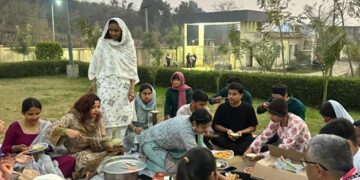It’s that time of year again when sub-zero temperatures grip the Valley, electricity disappears into a parallel universe, and our politicians light the way forward – not with solutions, of course, but with the warm glow of their rhetorical gimmicks. Omar Abdullah now vows to return “autonomy” to SKIMS, as if this word, “autonomy,” hasn’t already been stretched and wrung dry to explain away decades of political failures. Meanwhile, Ruhulla Mehdi has taken umbrage at railway lines being extended to other parts of the region, though one struggles to remember a single project he’s pushed for his own constituency of Budgam. This is Kashmiri politics at its finest – where speeches are fiery, promises hollow, and accountability as mythical as the Yeti.
In this edition of Bitter Truth, let us dissect why our politicians are obsessed with non-issues and emotional appeals while daily realities like power outages, unemployment, and infrastructure decay remain low on their agenda. Is it sheer incompetence? Or do these theatrics serve a deeper, more cynical purpose?
Rhetoric vs Reality: Omar Abdullah’s “Autonomy” Fixation
Omar Abdullah’s recent pledge to restore autonomy to Sher-i-Kashmir Institute of Medical Sciences (SKIMS) is a masterclass in political absurdity. First, let’s address the elephant in the room: SKIMS is already a functional, autonomous medical institution. The question of autonomy isn’t even on the radar for most Kashmiri households struggling with daily crises like exorbitant power bills and frozen pipes. But Omar, in his infinite wisdom, believes this is the hill to die on.
Why? Because it’s easy. Unlike reforming J&K’s failing health infrastructure – where primary health centers are underfunded, staff shortages persist, and rural areas lack access to even basic healthcare – fighting for the “autonomy” of SKIMS is an intellectual stunt with no measurable accountability. It’s an issue designed to inflame emotions rather than solve problems, a trademark tactic of Kashmiri politics. After all, why risk real reform when you can bask in applause for sloganeering?
That said, the services provided to Kashmir by SKIMS, despite infrastructural shortfalls and lack of or outdated equipment, are acknowledged far and wide by Kashmiris. This was especially true during the COVID-19 pandemic when doctors elsewhere often shied away from treating patients due to fear or inadequate safety measures. SKIMS doctors, on the other hand, stood resolutely by their patients, risking their own lives to serve the people of the Valley. Their courage and commitment turned SKIMS into a beacon of hope during one of the darkest chapters of public health in recent memory.
Instead of raking up the autonomy issue, Omar Abdullah could direct his political clout toward helping SKIMS make further strides. If Abdullah argues that the new political structure of the Valley renders it beyond his purview, fair enough. He could still lobby with the Lieutenant Governor’s administration to secure the necessary funds, approvals, and policy support. Autonomy, after all, is not a magic wand. It’s not as though granting autonomy would instantaneously solve SKIMS’s challenges. Progress requires consistent effort, lobbying, and practical measures – things Abdullah could spearhead if he chose to prioritize action over rhetoric.
Urgent Requirements at SKIMS
To illustrate, here’s a short list of the pressing needs at SKIMS that require immediate attention:
- Modernization of Equipment: Many critical departments, including oncology, cardiology, and nephrology, are operating with outdated equipment that hampers efficiency and quality of care.
- Infrastructure Expansion: The existing infrastructure is insufficient to meet the growing patient load, especially in emergency services and intensive care units (ICUs).
- Manpower Augmentation: There is an acute shortage of specialized medical staff, including surgeons, anesthetists, and technicians, which compromises service delivery.
- Research and Development: SKIMS, as a premier institute, has enormous potential for research, but this remains underutilized due to a lack of funding and policy support.
- Decentralization of Services: Satellite centers in rural districts could reduce the burden on the main institute, but this requires state-level planning and execution.
Addressing these issues would go a long way toward improving healthcare in Kashmir. Omar Abdullah’s focus on autonomy might score political points, but wouldn’t it serve Kashmiris better if he championed these concrete, life-saving reforms instead? Kashmir deserves leaders who prioritize progress over applause. If Abdullah genuinely cares about SKIMS and the people it serves, there’s no better way to prove it than by taking tangible steps to ensure the institution thrives, with or without autonomy.
Ruhulla Mehdi: Criticism Without Contribution
And then we have Ruhulla Mehdi, who suddenly finds the idea of extending railway lines to other districts of Kashmir to be a gross injustice. One wonders if the concept of “progress” offends him, or perhaps he’s just allergic to trains. What’s truly baffling is how Mehdi can grandstand about “unfair development” elsewhere while Budgam – his home turf – remains in dire straits. Roads here are pockmarked like the surface of the moon, public services barely function, and industries are non-existent. Yet Mehdi’s outrage is reserved for railway lines, not for the chronic neglect of the district he supposedly represents.
Perhaps Mehdi’s selective outrage is less about development and more about diversion. It’s much easier to rile up constituents over imaginary slights than to roll up your sleeves and address Budgam’s crippling unemployment or the absence of higher educational institutions. Mehdi, like so many Kashmiri politicians, thrives on turning molehills into mountains while the real mountains of neglect and inefficiency go untouched.
Darkness in Sub-Zero Temperatures: The Politicians’ Convenient Blind Spot
As Kashmir plunges into darkness, quite literally, one might expect our political leaders to prioritize solutions to the region’s chronic power woes. After all, freezing temperatures and 12-hour power cuts aren’t exactly conducive to emotional speeches about autonomy and railroads. Yet silence prevails. Omar Abdullah, Mehdi, and their ilk have little to say about the misery of families huddling around wood stoves, or businesses grinding to a halt due to erratic electricity.
Isn’t it curious how none of these leaders take the podium to demand energy independence for J&K? Why don’t we see fiery speeches about reclaiming hydroelectric projects from NHPC, which reaps billions from Kashmiri rivers while leaving us in the cold? Why is no one talking about reducing T&D losses, investing in solar energy, or exploring wind power potential? The answer is simple: real issues require real effort, and effort isn’t as glamorous as grandstanding.
Why Non-Issues Work for Politicians
This brings us to the crux of the matter: why do Kashmiri politicians consistently rake up non-issues? The answer lies in the art of distraction. Emotional appeals serve three critical purposes for our political class:
- Avoiding Accountability: By framing the narrative around abstract issues like autonomy or perceived injustices, politicians shift focus away from their own failures. It’s a clever tactic to ensure no one asks uncomfortable questions about governance, or lack thereof.
- Keeping the Electorate Emotional, Not Rational: Kashmiri politicians have long thrived on emotionally charged politics. By invoking historical grievances or imaginary threats, they prevent the electorate from making rational, issue-based voting decisions. A citizen worried about electricity or unemployment might demand change, but one consumed by emotional rhetoric is more likely to stay loyal to the status quo.
- Perpetuating Their Relevance: Non-issues allow politicians to insert themselves into the public discourse without actually doing anything. Whether it’s Mehdi lamenting railway lines or Omar championing SKIMS autonomy, these issues keep them in the headlines without the risk of measurable failure.
The Cost of Emotional Politics
While politicians indulge in their rhetorical games, the cost to ordinary Kashmiris is immense. Consider the following:
- Power Deficit: J&K suffers from a power deficit of 30%, one of the highest in India. Despite producing over 3,500 MW of electricity, the state remains in darkness because the lion’s share is exported to other states.
- Unemployment: J&K’s unemployment rate hovers around 28%, far above the national average. Youth, educated and ambitious, are left with no choice but to migrate for opportunities. But not all belong to the privileged class to migrate, and nearly none have resources to do so.
- Infrastructure Decay: Rural areas remain cut off during winters due to poor road connectivity, healthcare facilities are overstretched, and public schools lack basic amenities.
These are the issues that demand urgent attention, yet they remain conspicuously absent from political discourse. Instead, we are treated to endless debates over autonomy, vague accusations of injustice, and other distractions that have no bearing on our daily lives.
A Wake-Up Call for Kashmiris
The bitter truth is that Kashmiri politicians rake up non-issues because we let them. Every time we applaud their fiery speeches about autonomy or railroads, we reinforce the notion that rhetoric matters more than results. Every time we fall for their emotional appeals, we give them a free pass to ignore the real issues plaguing our lives.
It’s time for Kashmiris to demand better. Instead of being swayed by lofty speeches, we must hold our leaders accountable for tangible outcomes. Where are the power reforms? Where are the job-creation initiatives? Where are the infrastructure projects that can lift us out of stagnation? Until we start asking these questions, the status quo will persist.
Conclusion: The Politics of Convenience
Omar Abdullah’s autonomy pledges, Mehdi’s railway grievances, and the general obsession with emotional politics are not accidental; they are deliberate strategies to keep us distracted. But as we sit in darkness, freezing in sub-zero temperatures, it’s clear that these tactics are no longer sustainable.
Kashmir deserves leaders who tackle real issues with real solutions. Until we demand that, we’ll remain trapped in this cycle of rhetoric and neglect – a bitter truth that should haunt every Kashmiri as we go through another long, cold winter. Naar kangaer!
An author, a communications strategist, Dr Sanjay Parva was a debut contestant from 28-Beerwah 2024 Assembly Constituency





